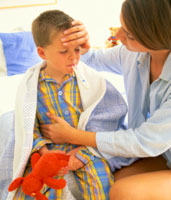Emma Hammett, from First Aid For Life, describes how to cope with common - but often terrifying - first aid situations

Febrile Convulsions
Febrile convulsions are incredibly common in small children and are fits or seizures caused if they are unwell and their body temperature rises really quickly. 1:20 pre-school children will experience a febrile convulsion at some point.
The key is to keep your child’s temperature down if they are unwell. If it is higher than normal, take off excess clothes, gently tepid sponge your child under the arms and on their forehead, give them plenty to drink, open a window (without allowing them to get too cold) and give Paediatric Paracetamol (Calpol) or Paediatric Ibuprofen (Neurofen). Ibuprofen has been proven to be more effective at lowering temperatures than Calpol. Do not give your child a bath as they could start fitting in the bath.
A febrile convulsion can be a full thrashing around Grand Mal, tonic clonic type of fit, or be an absence seizure where they are rigid and staring, or anything in between. The fit is not life threatening, does not cause any long term damage and does not mean that your child will have fits for the rest of their lives – they will be fine.
If your child starts fitting move things away from them to avoid injury, protect their head, but do not pick them up or restrain them. They could bite their lips or tongue but there is nothing you can do to help this during the fit. Do not put anything in their mouth. Look at your watch and time the fit. If the fit lasts for more than 3 minutes, phone the emergency services immediately.
The fit can last from seconds to minutes, and they may go blue and stop breathing. Once the fitting stops, they will be unconscious but breathing and must be put into the recovery position on their side, to keep their airway open. They will typically remain unconscious for around 10 minutes and be fractious and groggy afterwards. You should phone for an ambulance, although if the fitting has stopped within 3 minutes there is nothing extra that the Paramedics will do. After their first fit they are likely to be admitted to hospital for observation and tests.
Unfortunately, once they have had one fit, they are likely to have more, so always keep their temperature down during illness. Fortunately it does not cause any long term damage and your child will grow out of it between the ages of 4 and 6.
First Aid for life provides this information for guidance and it is not in any way a substitute for medical advice. First Aid for Life is not responsible or liable for any diagnosis made, or actions taken based on this information. The best way to be prepared for action in an emergency is to attend a practical First Aid course.
www.firstaidforlife.org.uk
